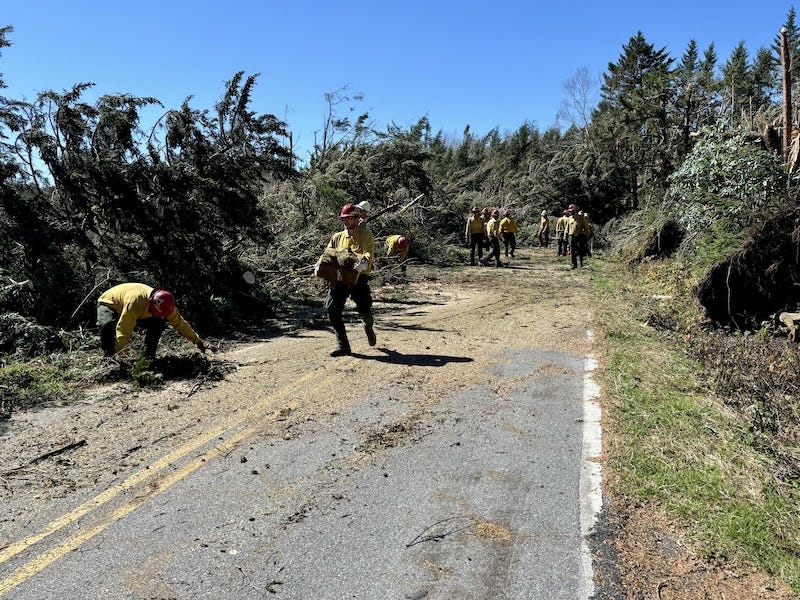The good fight
Federal layoffs threaten access to our already limited public lands—but there is good news.

Our biweekly publication schedule is woefully slow compared to today's news cycle. I tried writing this before my vacation last week but knew anything I wrote would be outdated by Tuesday morning.
So: I’ll keep this brief. As a Southlands reader, you probably know already about the devastating job cuts at the National Park Service. Here in the South, our relatively scarce bits of public land are all the more precious for that scarcity. Great Smoky Mountains National Park has ranked since 1944 as the most-visited park in the system. The park lost a dozen staff members so far, out of a full-time staff of just 200. Florida’s famous parks, including the Everglades, have lost 20 employees. While the NPS has not released a full accounting of the firings, the crowdsourced data suggests that Southern parks have been particularly hard hit. ProPublica notes that funding freezes and travel limitations on federal employees has forced the Park Service to cancel a massive, essential controlled burn in the Everglades. Over at the Oxford American, you can hear from some of the staff fired from the Buffalo National River In addition to noting these impacts to our region, I want to encourage you to join the good fight that’s already raging to protect this resource.
Perhaps worse than the Park Service cuts, at least for us here in the South, are the 3,400 layoffs from the U.S. Forest Service—roughly 10% of the total staff. North Carolina’s Pisgah and Nantahala National Forests are also among the country’s busiest, with over a million visitors combined. The forests were savaged last year by Hurricane Helene and are currently blazing with wildfires. They need all the help they can get.1
“It’s more than just the workload, we’re losing the future of the agency,” a USFS program manager told the Asheville Citizen-Times about the layoffs. “These are bright, talented, young folks who have gone into public service, not for the paycheck but because they want to do good for the world.”
America’s public lands are beloved, so it’s not surprising that these layoffs have sparked protests—including here in the South. Over this past weekend, public land advocates gathered in Gatlinburg, Tennessee, one of the Great Smoky gateway towns; at the Blue Ridge Parkway Visitors Center; at the Big Thicket Biosphere Reserve in East Texas; and at the edge of Pisgah National Forest. Probably at other sites, too—if you know of more, leave ‘em in the comments!
Even before those protests, the ire of the nation had forced a backtracking. On Reddit, one poster indicated that U.S. Forest Service permanent employees in “Region 8”—which spans the South—were being rehired. A biologist at the Pisgah National Forest was reinstated after being deemed “mission critical.” The National Park Service, meanwhile, after some delays, began to move forward with seasonal hiring—a process that provides an essential workforce during the peak tourist season.
But the delays will still have a cost, as will the lost jobs. You can expect our public lands to be in rough shape this summer: visitor centers and campgrounds closed; trails overgrown; trash uncollected. That means, more than ever, being a good citizen matters now. Be kind to rangers, who will have to work harder with fewer resources; abide by the leave-no-trace ethics. But in this case, good citizenship means active citizenship, too: keep speaking up to fight for our public lands.
—Boyce
Southlander Spotlight
Surfing may not be prominent in your list of Southern sports—but here we surf nonetheless. I always get a kick out of seeing the waves on Alex Dantin’s Instagram.
In season
>>> The whooping cranes are descending on Texas’s coast.
The lowdown
Some other not-so-good from this administration, especially for Southlands HQ: New Orleans may not get so many trees, and one last remaining rural stretch of the Mississippi, just upstream of the city, won’t be preserved with historic status. // In better news, New Orleans-to-Mobile rail travel should commence in June. // AI is reshaping Southern oyster farms. // The big Southern conservation fights continue: Georgia lawmakers are once again hoping to protect the Okefenokee National Wildlife Refuge; and legal wrangling over Louisiana’s big sediment diversion just will not end. // Country star Luke Combs has launched his own line of turkey-hunting gear.
I haven’t begun to try to digest how Trump’s call for more timbering in national forests will impact the region.





Also, no one seems to know what this means for the Buffalo National River: https://www.arkansasonline.com/news/2025/mar/03/fate-unclear-on-plans-by-doge-to-ax-15-arkansas/
Arkansas: https://arktimes.com/arkansas-blog/2025/03/02/hundreds-attend-rally-to-show-support-for-hot-springs-national-park-staff